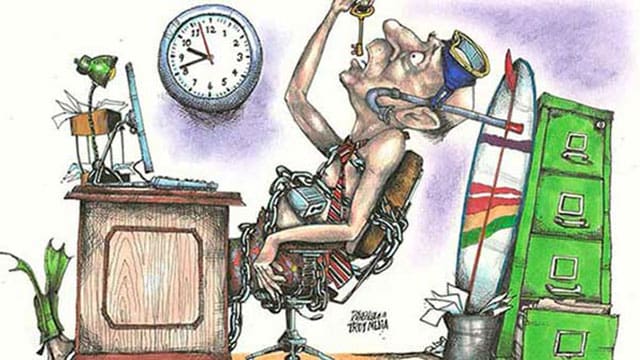A new report warns bloated bureaucracy, political gatekeeping, and union control are eroding Canada’s public service
Canada’s public administration has become bloated, dysfunctional and dominated by political insiders more concerned with securing power than delivering results, a new report warns.
The report, Restoring Accountability: Fixing Canada’s Public Administration, authored by former MP Dorothy Dobbie and published by the Frontier Centre for Public Policy, argues that political interference, union entrenchment and top-heavy management have eroded what was once one of the world’s most respected public services.
“Canada’s public service used to be professional, efficient and dedicated,” Dobbie writes. “Today, it is mired in patronage, inefficiency and a system that rewards connections over competence.”

Dorothy Dobbie
For interview requests, click here
 New report lays out a path to restoring accountability. |
| Recommended |
| Canadians want to cut the size of Ottawa’s bureaucracy
|
| Federal government’s bloated bureaucracy needs an immediate overhaul
|
| Trudeau’s bloated bureaucracy a drain on taxpayers
|
Dobbie, a former MP, a Member of the Order of Canada and former president of the Canadian Association of Former Parliamentarians, points to the unchecked power of political staffers as a major cause of dysfunction. Instead of elected officials making decisions, unelected advisers—often with little real-world experience—are dictating policy behind closed doors.
“These staffers act as gatekeepers, controlling access to ministers and even prime ministers,” she says. “They filter information, suppress dissenting opinions and prioritize political optics over sound policy.”
She cites the recent controversy surrounding intelligence briefings on foreign interference that were allegedly buried before reaching decision-makers.
“Withholding critical information for political reasons isn’t just unethical—it’s dangerous,” Dobbie warns.
The report also targets public-sector unions, accusing them of prioritizing job security over performance. Hiring and promotions are largely determined by seniority rather than merit, making it nearly impossible to fire underperforming employees.
“Public servants are no longer a team working for the good of Canadians,” Dobbie writes. “They are adversaries of the government, more focused on securing raises and benefits than serving the public.”
This bureaucratic expansion has led to an explosion in middle management, redundant oversight and slow decision-making. For example, the federal government’s National Occupational Classification system consists of 516 different occupational categories—each adding layers of oversight and red tape that slow operations.
“Instead of empowering civil servants to use their judgment, the system now relies on rigid procedures, endless paperwork and a fear of making independent decisions,” she says.
Beyond bureaucratic dysfunction, Dobbie warns that the political candidate selection process is also being manipulated. Rather than allowing grassroots members to nominate candidates, party insiders hand-pick contenders, shutting out qualified individuals in favour of loyalists.
“This is not democracy. This is control,” she writes. “Talented, service-driven individuals are being pushed aside in favour of political operatives and backroom players.”
The report warns that some parties are also exploiting ethnic voting blocs, relying on demographic groups to deliver election victories in exchange for political favours.
Dobbie calls for sweeping changes, including:
- Ending political patronage – Reducing the unchecked power of political staffers and ensuring ministers, not unelected insiders, are accountable.
- Hiring on merit, not quotas – Returning to a professional, results-driven public service.
- Slashing bureaucracy – Cutting unnecessary management layers and streamlining decision-making.
- Reforming union influence – Prioritizing performance and accountability over rigid seniority rules.
- Restoring democracy in political parties – Ensuring the nomination process is open and competitive rather than controlled by recruiters and selection committees so candidates emerge through a democratic process rather than party gatekeeping.
- Reducing dependence on paid campaign specialists – Encouraging political parties to rely more on volunteers instead of hiring professional campaigners, whose loyalties lie with their salaries rather than party principles. This would shift focus from fundraising to policy development.
- Decentralizing power from the leader’s office – Redistributing power from party leaders, who currently wield excessive control over political appointments and decision-making. Ministers should be able to hire their own staff and be directly accountable for their portfolios.
- Enhancing ministerial accountability – Ensuring ministers, not political staffers, directly oversee their staff, and that civil servants communicate directly with ministers rather than through intermediaries.
- Preventing political staffers from immediately running for office – Introducing a waiting period before political staffers can transition into elected roles, similar to restrictions on lobbying, to prevent conflicts of interest and undue influence.
Dobbie warns that without urgent reform, Canada’s government will continue to stagnate, costs will rise and public trust will erode.
“Canadians deserve a government that works for them—not one that serves the interests of insiders,” she says.
| News Desk
Explore more on Federal debt and deficit, Public service, Federal politics, Trudeau government
Troy Media is committed to empowering Canadian community news outlets by providing independent, insightful analysis and commentary. Our mission is to support local media in building an informed and engaged public by delivering reliable content that strengthens community connections, enriches national conversations, and helps Canadians learn from and understand each other better.

